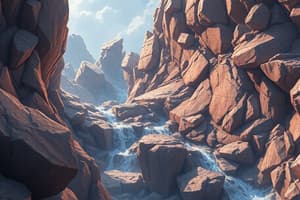Podcast
Questions and Answers
What is one of the changes that rocks can undergo over short and long periods of time?
What is one of the changes that rocks can undergo over short and long periods of time?
- Becoming harder
- Melting into magma
- Transforming into soil (correct)
- Erosion
Why is it important to take your time in answering the difficulties encountered in this learning material?
Why is it important to take your time in answering the difficulties encountered in this learning material?
- To cause frustration
- To waste time
- To enhance understanding (correct)
- To delay the progression of the lessons
Where do endogenous geological processes originate from?
Where do endogenous geological processes originate from?
- Within the Earth itself (correct)
- Exogenous sources
- Outer space
- The atmosphere
Who can you ask for assistance if you encounter difficulties with the lessons and activities?
Who can you ask for assistance if you encounter difficulties with the lessons and activities?
What are students expected to be able to do after going through this learning material?
What are students expected to be able to do after going through this learning material?
What does the K-W-L assess the prior knowledge and understanding of?
What does the K-W-L assess the prior knowledge and understanding of?
What is weathering of rocks?
What is weathering of rocks?
Why do rocks on the Earth's surface weather faster than those underground?
Why do rocks on the Earth's surface weather faster than those underground?
What leads to physical or mechanical weathering?
What leads to physical or mechanical weathering?
What is the result of unloading (release of pressure) in the process of physical weathering?
What is the result of unloading (release of pressure) in the process of physical weathering?
What causes frost wedging?
What causes frost wedging?
How does thermal expansion contribute to physical weathering?
How does thermal expansion contribute to physical weathering?
What happens when the temperature drops to 0°C in the context of thermal expansion?
What happens when the temperature drops to 0°C in the context of thermal expansion?
What does weathering lead to?
What does weathering lead to?
What is physical or mechanical weathering similar to?
What is physical or mechanical weathering similar to?
What are the factors that can cause weathering?
What are the factors that can cause weathering?
Study Notes
Changes in Rocks
- One of the changes rocks can undergo over time is weathering, a process that breaks down rocks into smaller fragments or sediments.
Importance of Taking Time
- It's essential to take your time when encountering difficulties in learning materials to ensure understanding andAvoidance of misconceptions.
Origin of Endogenous Processes
- Endogenous geological processes originate from within the Earth.
Seeking Assistance
- If you encounter difficulties, you can ask teachers or instructors for assistance with lessons and activities.
Learning Objectives
- After completing this learning material, students are expected to understand and describe the processes of rock weathering.
K-W-L Assessment
- The K-W-L (Know, Want to know, Learned) assessment evaluates students' prior knowledge and understanding of geological processes.
Weathering of Rocks
- Weathering is the breakdown of rocks into smaller fragments or sediments through physical or chemical processes.
Factors Affecting Weathering Rates
- Rocks on the Earth's surface weather faster than those underground due to exposure to environmental factors.
Physical Weathering
- Physical or mechanical weathering occurs through the fragmentation of rocks into smaller pieces without a change in composition.
Causes of Physical Weathering
- Unloading (release of pressure) and freeze-thaw cycles can lead to physical weathering.
Frost Wedging
- Frost wedging occurs when water seeps into cracks in rocks and expands as it freezes, causing the rock to break apart.
Thermal Expansion
- Thermal expansion, caused by temperature fluctuations, contributes to physical weathering by exerting pressure on rocks.
Effects of Temperature on Rocks
- When the temperature drops to 0°C, water in rocks expands, causing them to break apart.
Consequences of Weathering
- Weathering leads to the formation of sediments and the alteration of rocks.
Analogies to Physical Weathering
- Physical weathering is similar to the mechanical breakdown of materials, such as the crushing of rocks into gravel.
Factors Causing Weathering
- Factors that can cause weathering include temperature fluctuations, wind, water, ice, and pressure changes.
Studying That Suits You
Use AI to generate personalized quizzes and flashcards to suit your learning preferences.
Description
Learn about the process of weathering and its effects on rocks over short and long periods of time. Understand how endogenous geological processes originate from within the Earth itself.




